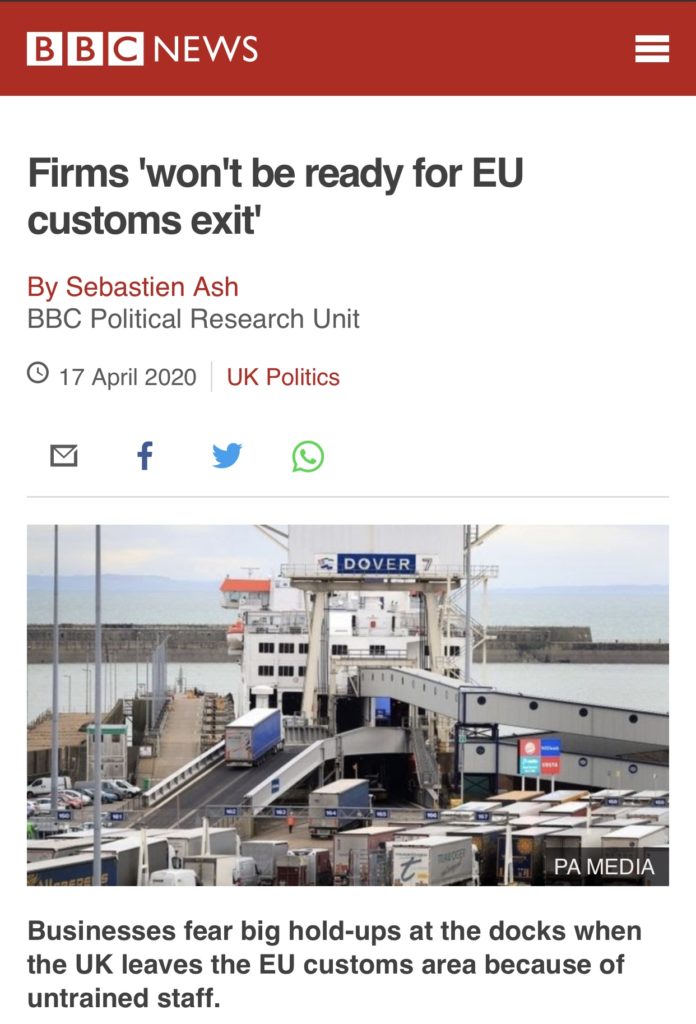Firms ‘won’t be ready for EU customs exit’. More training needed.
BBC News today writes about the need for training of customs experts on the 31 December 2020 when United Kingdom leaves the EUropean Union after an eleven months transition period.
At that moment, when UK leaves the EU customs union and customs territory, border formalities will emerge with or without a Free Trade Agreement. From first of January 2021 there will be a demand for customs declarations in both directions – as well as a range of other border formalities. For more than 150.000 companies in UK alone that will be the first time ever.

In the article BBC states that many businesses fear big hold-ups at the docks when the UK leaves the EU customs area because of untrained staff.
The British Chambers of Commerce says the government has not invested enough in training for companies faced with new customs paperwork to fill in.
Ministers have set aside £34m to help up to 250,000 companies that trade with the EU.
But figures obtained by the BBC under freedom of information show just 878 firms have received a total of £17.5m.
HM Revenue and Customs said “the funding has already helped fund thousands of training courses as well as those companies improving IT hardware and growing staff”. As it stands the UK, excluding Northern Ireland, is set to leave the EU’s customs area at the end of the post-Brexit transition period on 31 December this year.
The government has said it will refuse to extend the Brexit transition period, even if the EU requested a delay.
The deadline could be extended by up to two years but ministers and their EU counterparts would have to agree an extension before July this year.
Downing Street has said that any extension would keep the UK bound by EU rules when it instead “needs flexibility” to deal with coronavirus.
But Alex Veitch, head of international policy at the Freight Trade Association, said planning for an exit from EU rules at the same time as navigating the coronavirus crisis was “not possible”.
The kinds of jobs being furloughed “are those which are crucial to managing Brexit,” he added.
“It is the same people wrestling with the international freight challenge who would be the ones planning the Brexit challenge.”
Asking for an extension was a “reasonable” demand, he added, and his organisation would not have done so “before the coronavirus crisis hit”.
Under the government’s proposals for the future relationship with the EU, companies will have to complete customs declarations when exporting to or importing from the EU
Such declarations are not not necessary while the UK remains within the EU customs area.
HMRC estimates that between 150,000 and 250,000 companies who trade with the EU will be filling in customs forms for the first time.
Among other things the government’s grant money has supported attendance at 3,593 training courses for customs staff.
The government’s own UK Customs Academy, established to help provide the businesses with the customs expertise and training they need to meet the demands of the UK’s new trading relationship with the EU, has enrolled delegates on 540 courses, of which 99 have been completed.
Liam Smyth, director of Director of international trade at the British Chambers of Commerce, said: “Whilst traders are focussed on survival and working out how to deal with the impact of coronavirus, the problem of making 250 million more customs declarations at the end of the transition period has not gone away.
“Big challenges need big solutions. Cargo will grind to a halt if goods can’t be cleared by our customs system.
“The funding the government has announced so far isn’t enough.
“If the government is serious they should invest more to employ and train the huge number of people needed to keep the UK trading beyond transition.”
Altogether, 403 of the 878 companies to have received funding are so-called customs intermediaries, who offer to complete customs formalities on behalf of other businesses.
Businesses without the in-house capability to fill in customs paperwork will have to turn to intermediaries to help them after the end of the transition period.
According to HMRC, the most recent round of funding, open only to customs intermediaries, has so far financed the creation of 500 new posts.
But estimates, endorsed by the Chancellor of the Duchy of Lancaster, Michael Gove, suggest the UK could need a further 50,000 customs agents.
In a statement HMRC, said: “The UK already has a well established industry of customs intermediaries who serve British businesses trading outside the EU.
“The government’s £34m grant scheme will support the growth of this sector to encompass EU trade after 2020.”
Source: BBC News
You must be logged in to post a comment.